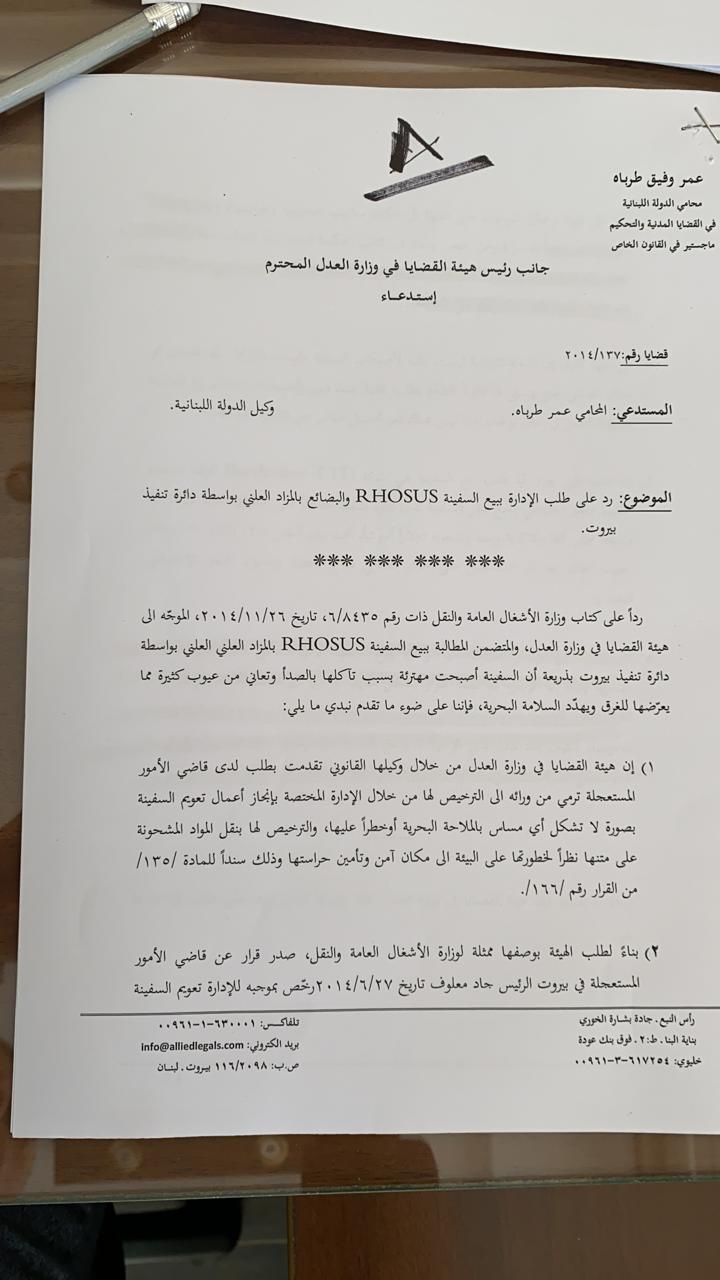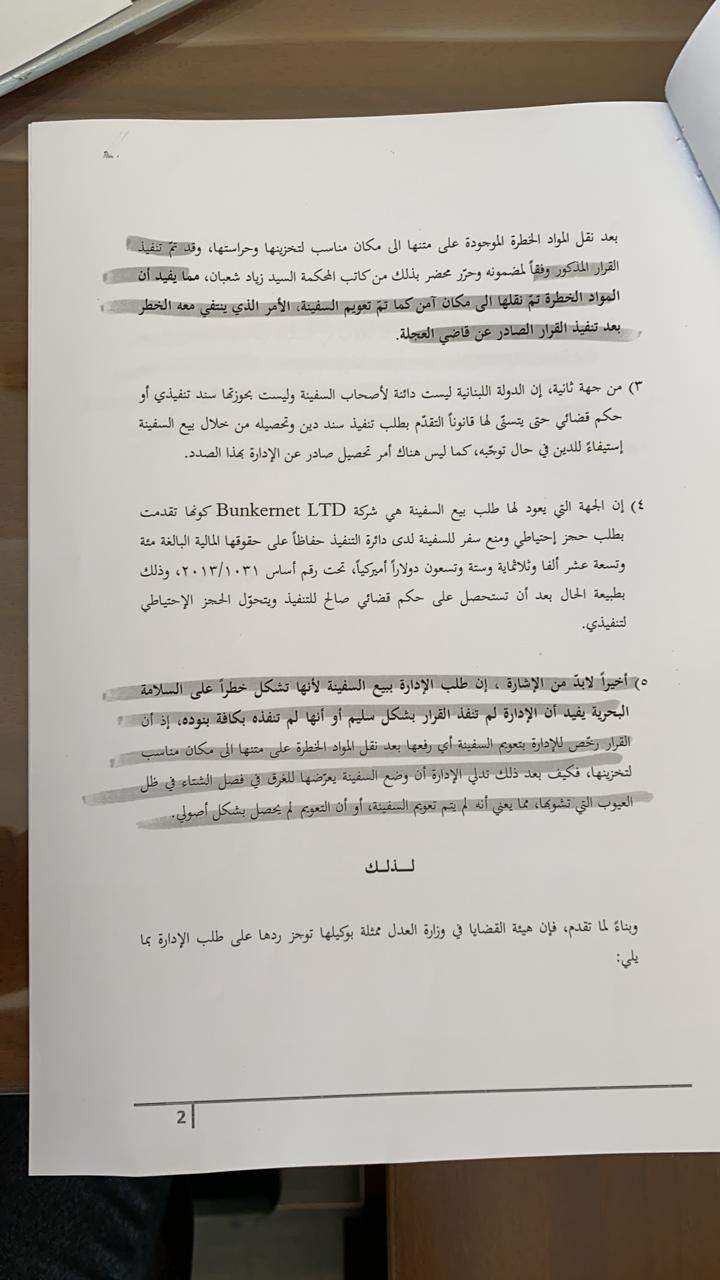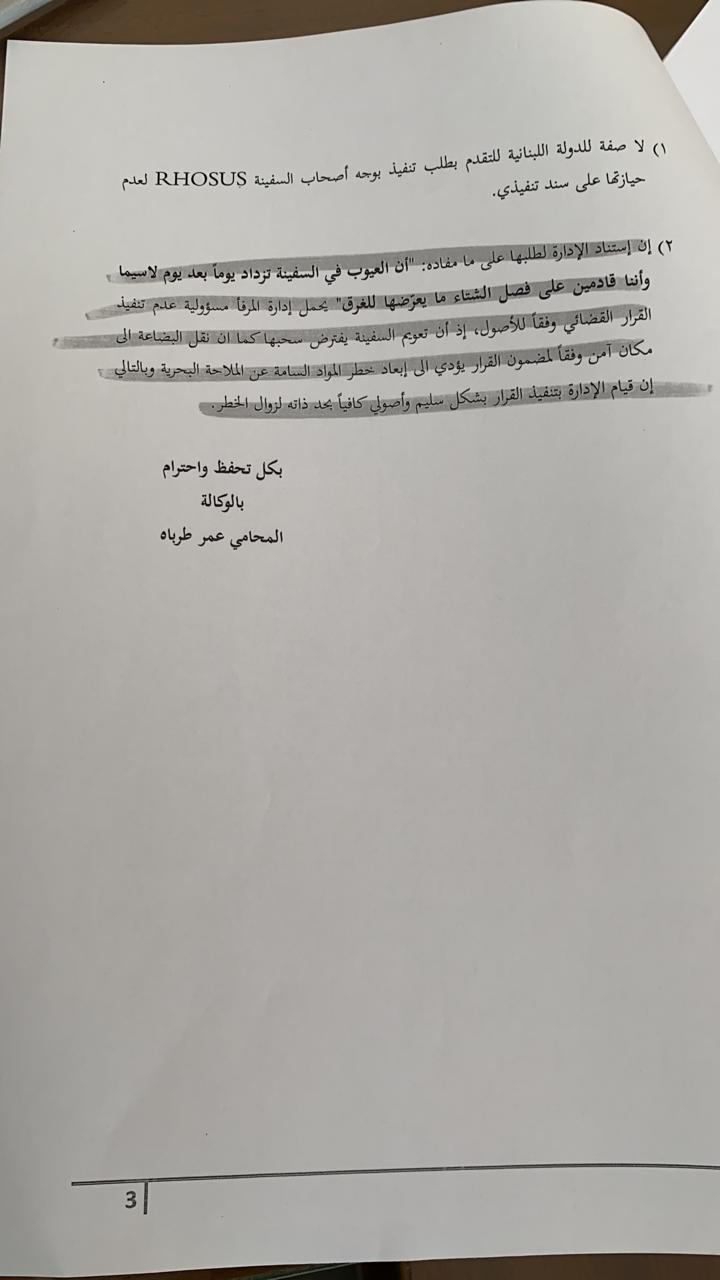December 18, 2014 Response from Case Authority Lawyer to the Directorate General of Land and Maritime Transport
(left to Right)
Omar Wafik Tarabah
Lawyer of the Lebanese State
Civil and Arbitration Cases
Masters in Private law
To: HH the Head of Case Authority at the Ministry of Justice
Petition
December 18, 2014
Case no: 137./2014
Petitioner: Omar Tarabah, lawyer acting on behalf of Case Authority
RE: Response to the Request of the Administration to sell the “Rhosus” and the merchandise [onboard of the ship] in a public auction through the Enforcement Department in Beirut
In response to the letter of the Ministry of Public Works and Transport no:6/8435 dated November 26, 2014 sent to the Case Authority at the Ministry of Justice, concerning a request to sell the “Rhosus” in a public auction through the Enforcement Department in Beirut, on the grounds that the ship is worn out because it has corroded to rust and suffers from many flaws which expose it to the risk of sinking and threatens the maritime safety, therefore in light of the above we state the following:
- The Case Authority at the Ministry of Justice submitted a request to the urgent matters judge in order to authorize the [Case] Authority through the competent administration to complete the refloating of the ship in a manner that does not jeopardize or threaten, by any means, the safety of the maritime navigation, and authorize it to move the merchandise onboard of the ship given the risks its impose to the environment to a safe and guarded place, pursuant to article 135 of decision no: 166.
- At the request of the [Case] Authority in its capacity as representative of the Ministry of Public Works and Transport, HH Jad Maalouf, judge of urgent matters in Beirut, issued a decision dated June 27, 2014, in which he authorized the Administration to refloat the ship after transferring the hazardous material onboard to an appropriate place to store it and guard it. The mentioned decision was enforced, and a record was prepared by Ziad Shaaban, court clerk, stating that the hazardous material was transferred to a safe place and that the ship was refloated, which eliminates the danger after the decision issued by the urgent matters judge was enforced.
- The Lebanese state is owed no outstanding dues by the ship owners and does not have an enforcement deed or court ruling to legally submit a request to enforce and collect a debt bond though selling the ship, to collect the debt if matured, and there is no collection order issued by the Administration in this regard.
- The party who can request selling the ship is “Bunkernet LTD” since it submitted a request to provisionally impound the ship and ban it from leaving the country to the Enforcement Department to preserve its financial rights amounting to USD 119,396 under no: 1031/2013, naturally after obtaining an enforceable court ruling and then the provisional impoundment becomes an executive impoundment.
- Finally, it must be noted that the request of the Administration to sell the ship because it threatens the maritime safety means that the Administration did not enforce the decision properly or it did not enforce all of its provisions, since the decision authorized the Administration to refloat the ship, which means lifting it after moving the hazardous material onboard to an appropriate place to store it, so how come the Administration states that the ship’s situation might lead to its sinking during winter given the flaws it suffers from, which means that the ship was not refloated or the refloating did not occur properly.
Therefore,
And per the above, the Case Authority at the Ministry of Justice represented by its lawyer, summarizes its reply to the Administration request as per the following:
- The Lebanese State has no competence to submit an enforcement request against the “Rhosus” owners since it does not have an enforcement deed.
- By invoking that “the flaws of the ship are becoming worse with time, and as winter approaches, the ship is at risk of sinking” in its request, the Administration holds the port management responsible for not duly enforcing the court order, since refloating the ship implies removing it and given that transferring the cargo to a safe place pursuant to the decision eliminates the risk imposed by the toxic substance to the maritime safety, thus duly and properly enforcing the decision by the administration is enough to eliminate the risk.
Respectfully,
By the power of Attorney
Lawyer Omar Tarabah



